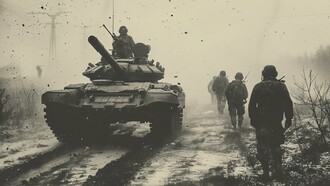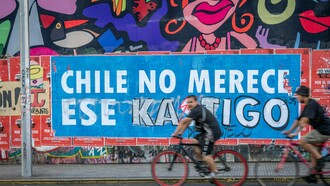The assassination of political leaders, whether government officials or leaders of social movements, has been used since ancient times to achieve specific political objectives, whether to eliminate the political ideas they symbolize, weaken the social mobilization they lead, or justify the repression that follows the assassination. Assassination does not always produce the desired effects. Sometimes it has counterproductive effects, and assassinated leaders do not always become martyrs or are remembered as such for long. From Julius Caesar, assassinated in 44 AC, to Abraham Lincoln, assassinated in 1865, history is full of assassinated political leaders. One would think that in the post-World War II period, conditions would exist for political assassination to cease to exist or diminish in intensity.
On the one hand, there was the intense memory of death as a political instrument, and on the other, liberal democracy was celebrated as the only legitimate political regime, a regime in which one debates with one's adversary rather than killing political enemies. Unfortunately, this did not happen, and the conditions seem to be in place for the use of political assassination to increase. The recent resurgence of hate politics promoted by far-right forces and the resulting increase in social polarization are the breeding ground in which the assassination of political leaders may increase. Not to mention the wars, local for now, that have been proliferating. Israel, for example, is adept at using this method. How many political leaders from Hamas, Hezbollah, Yemen, or Iran have been assassinated in recent times?
This is a vast field that I do not seek to analyze in its entirety, even if I restrict myself to the period after World War II. For example, I am not referring to assassinations that result from internal struggles within the social movement, political party, or government to which the victims belong. Nor do I focus on cases where the assassination of leaders occurs in the context of massacres or civil wars affecting many thousands of people, such as in Colombia, Rwanda, Indonesia, Sri Lanka, Sudan, or Palestine. I limit myself to analyzing cases of murder of individuals in which the interference of external forces, whether national or foreign, is known. And even in this area, I do not intend to be exhaustive.
There are various types of leaders and their relationships with the movements or countries they lead. I am interested exclusively in prophetic leaders (as opposed to administrative or pragmatic leaders) with strong popular support. I have in mind a secularized version of a prophetic leader, although some leaders combine the religious and the secular. For me, a prophetic leader is someone who has a critical view of the world and their country and an alternative vision and has the courage to express this publicly and to implement consistent policies based on this vision, even though he knows that this goes against the interests of powerful social and political groups that have legal and illegal means at their disposal to bring them down. They are often charismatic leaders.
The reason for the interest in prophetic leaders is twofold: political and sociological. The political reason is that prophetic leaders are the ones most at risk of being assassinated. My aim in this text is to warn leaders who have not yet been assassinated but who are likely targets for assassination. The sociological reason has to do with two themes dear to the epistemologies of the South that I have been proposing: epistemicide and imposed failure. Recognizing and publicizing the danger of assassination is a crucial political act because it can prevent tragedy and transform that prevention into an opportunity to strengthen leadership itself and the public actions and policies it entails. I am not concerned here with the many failed assassination attempts. Perhaps the most famous, or most documented, case is that of Fidel Castro, who suffered numerous attempts by the CIA to assassinate him (including, for example, the offering of cigars with explosives).
Examples of prophetic leaders who were assassinated
Among the leaders of social movements, I recall, for example, Mahatma Gandhi. The undisputed leader of the struggle against British colonialism, Gandhi was assassinated in 1948 by a Hindu extremist. Martin Luther King, Jr., a great activist for Black civil rights in the US, was assassinated in 1968, with strong suspicions of involvement by the US secret services. Oscar Romero, archbishop of El Salvador, member of liberation theology, and denouncer of political repression in the country, was assassinated in 1980 by a Salvadoran army sniper trained at the infamous School of the Americas in the US.
Ken Saro-Wiwa, a famous Nigerian writer and member of the Ogoni people, was a leading activist against the environmental degradation caused by oil exploration by multinational companies in the Niger Delta. He was tried by a military court and sentenced to death by hanging in 1995. Malcolm X, leader of the Black nationalist and revolutionary movement in the US, was assassinated in 1965, officially by members of the Nation of Islam, while giving a lecture. Walter Rodney, revolutionary leader of British Guiana, was assassinated in 1980, and there are strong suspicions that the murder was ordered by the then-president, Linden Forbes Burnham. Ben Barka, a nationalist and socialist politician from Morocco, secretary of the Tricontinental Conference, and opponent of French imperialism and of King Hassan II of Morocco, was assassinated in 1966. He is believed to have been located by the Israeli Mossad and assassinated by French and Moroccan agents. It was also Mossad that made his body disappear.
Felix Moumié, from Cameroon, was poisoned in Geneva in 1960 by the French secret services. Henri Curiel, a Jewish-Egyptian communist activist who participated in the liberation of Algeria, was assassinated in Paris in 1978. Ruth First, an influential anti-apartheid activist in South Africa, was assassinated in 1982, on the orders of the South African government, in Mozambique, where she was in exile, with a letter bomb. Five years later, Albie Sachs, also from South Africa, narrowly escaped a similar attack. In 1984, Jeanette Curtis, another anti-apartheid activist, was assassinated, along with her six-year-old daughter, with a letter bomb in the Angolan city of Lubango. Dulcie September, representative of the ANC of South Africa in Paris, was assassinated in 1988. In the case of the Middle East, the tragedy of the genocide in Gaza overshadows the past dozens of assassinations of leaders fighting for Palestinian self-determination.
The list of prophetic rulers who have been assassinated is long, and in the vast majority of cases, imperialist forces have always been involved. Among the cases that have been most intensely engraved in the history of countries, I cite the following. Patrice Lumumba, Prime Minister of Congo, was assassinated in 1961 by the Belgian secret services with the collaboration of the CIA, which had long considered Lumumba a dangerous communist and had already attempted to assassinate him. His body was dismembered and dissolved in acid. All that remained was a gold tooth, which, by order of a Belgian judge, was returned to his family in 2023. Sylvanus Olympio, the first president of Togo, was assassinated in 1963 in a coup supported by the French secret services. Olympio defended the full financial sovereignty of the new African countries against France.
Kwame Nkrumah, Ghana's first president and a close ally of Lumumba, survived several assassination attempts, in this case organized by the British secret services, always with the help of the omnipresent CIA. He was deposed by a coup d'état in 1966, and natural death may have spared him from assassination. Eduardo Mondlane, leader of the FRELIMO liberation movement in Mozambique (today it would be considered a terrorist movement and was so designated by the fascist regime that ruled Portugal between 1926 and 1974), was assassinated in 1969 in a collaboration between dissident groups of FRELIMO and the Portuguese political police (PIDE).
Amílcar Cabral, president of Guinea-Bissau, already recognized as an independent country at the time, was assassinated in Conakry in 1973 by members of dissident PAIGC groups in collaboration with the Portuguese political police, who had already attempted to assassinate him three years earlier.
In the same year, President Salvador Allende, the post-war leader who took most seriously the possibility of building a truly socialist society without dispensing with liberal democracy, was forced to commit suicide in Chile. It was an “indirect” assassination ordered by Augusto Pinochet and the CIA. Samora Machel, the first president of Mozambique, died in a plane crash in 1986 while returning from a meeting in Zambia. Suspicions of South Africa's involvement in his death are well-founded (sabotage and interference with navigation instruments). Muammar Gaddafi was assassinated in 2011 by rebel forces supported by France, the US, the UK, and NATO. Gaddafi had proposed the creation of an African currency backed by gold.
Thomas Sankara, president of Burkina Faso, was assassinated in 1987. Sankara was a revolutionary leader who promoted true self-determination for people and African unity and rejected interference from the International Monetary Fund (IMF). There are well-founded suspicions that France was behind the assassination and supported the pro-French leader, Blaise Compaoré, who took power after the coup.
Consequences
The vast majority of these prophetic leaders died very young, some not even reaching the age of forty. They were therefore in the process of building projects, developing theories, and experimenting with practices that were far from being fully formulated or implemented. The differences between them are enormous, but they have some characteristics in common that we should highlight. They were nationalists and anti-imperialists. They believed in the sovereignty of peoples, in some cases recently achieved, and in the possibility of each country being master of its own destiny and development project. Being nationalists, they were also internationalists. They considered that political independence had been incomplete and that both imperialist neocolonialism and internal colonialism continued to impede the fair development of society.
The main symptoms of this were extreme social inequality, racism, the concentration of land and resources in private hands, patrimonialism (that is, control of the state largely by the same families or groups that had already dominated the country in the colonial period and in close alliance with the colonizing power), and international impositions that, until 1991 (the end of the Soviet Union), forced countries to choose between Western capitalism and Soviet socialism, when many rejected both models and wanted to build a new one in the hope of combining some of the good characteristics they saw in both existing models.
They were visionaries, some more than others, and almost all of them sought forms of South-South dialogue and coordination with the aim of strengthening the anti-imperialist struggle. Some of them left us works of enormous theoretical and political value that far transcend their time and context. This is the case with Nkrumah, Cabral, Sankara, and Rodney.
Epistemicide
Beyond the upheavals that their premature and violent deaths caused in the short term, I would highlight two main long-term consequences. The first is epistemicide, the violent destruction of knowledge. These leaders had ideas, political philosophies, and plans of action, which, whether they failed or succeeded, bore witness to the epistemic, philosophical, and cultural diversity of the world. Their assassination represents the past that has been repressed and the future that is no longer. What would the world be like today if they had not been assassinated, if their successes and failures and their virtues and defects could have been fully expressed in their societies? Much historical experience has been lost, the world has been impoverished, and the future has been left to the ideological monocultures of the most powerful.
The condition in which those who fight for a more just society find themselves today, both locally and globally, can be characterized as the result of an orphanhood caused by the destruction of so many mobilizing ideas, so many paths of hope, and so many silenced options. So that the blood has not been shed in vain, we must transform this orphanhood into a seed of new life. To begin with, we must learn about the struggles of prophetic leaders and the works they left us. These are not fixed recipes because we live in a world very different from the one they lived in. They are the only lights that can guide us in the darkness in which we find ourselves in this time of genocide, proto-fascism, plans for global war, and ecological collapse.
Imposed failure
The second consequence was the imposition of failure. The assassination of prophetic leaders was intended to prevent the countries of the global South from finding their own paths to development. The imposition was brutal and had two movements. The first movement consisted of converting, overnight, more than 90% of the world's countries into underdeveloped countries. In a short time, the concept of underdevelopment became a totalitarian concept. It was not just the economy that was underdeveloped; everything was underdeveloped, from social relations to religions, from ways of living to ways of coexisting, from rulers to the ruled, and from forms of community organization to land management. The attack on the self-esteem of countries was the great weapon of mass destruction of capitalism, colonialism, and imperialism in the postwar period.
The second movement, following the first, was to impose on the countries of the global South a single path out of the dead end to which they had been escorted by the imperialist countries. After the destruction of alternative thinking and practices, the only option left is to perpetuate the condition of underdevelopment. The countries that are victims of this are forced to try to survive beyond international promises, which are always benevolent in discourse but violent in practice. This is how the countries of the global South had to and still have to live with the “development aid” policies of the imperialist countries and the conditionalities and structural adjustment policies imposed by the World Bank and the IMF.
After the end of the Soviet Union, the impositions became more violent, and the countries and institutions that imposed them had to resort to corrupting local elites to reduce the political costs of imperialism. The plundering of natural resources through unequal trade and foreign debt are the two shackles that have prevented countries in the global South from achieving any success other than that of complying with the conditions that have led to their historical failure.
Prophetic leaders who can be assassinated
This section is speculative and based on postwar historical experience. I am well aware that history does not repeat itself and that today the elimination of prophetic leaders can be achieved in many ways. On the one hand, there is now a greater diversity of means of killing (the precision of drones guided by artificial intelligence, delayed-action poisons to disguise murder as natural death, etc.). On the other hand, there are ways to eliminate targeted leaders without physically killing them. It is enough to neutralize them politically, reducing them to civil death. With the collaboration of the hegemonic media and the courts, it is now possible (and easy) to eliminate political leaders through “global wars” against drugs, corruption, or terrorism, or in the name of “freedom of expression.” As an example, I cite a few cases of leaders in danger.
Ibrahim Traoré
Traoré has been president of Burkina Faso since 2022. He is a leader inspired by Thomas Sankara, the “African Che Guevara,” who led the country between 1983 and 1987. Like him, he is an army captain and took power at the age of 35. His position is perhaps more precarious, and the revolution he intends to lead is less ambitious than Sankara's. Sankara met with Fidel Castro, created committees to defend the revolution, organized literacy campaigns, and promoted policies mainly in the fields of health and housing. Like Sankara, Traoré rebels against French imperialism, advocates for food sovereignty through an agricultural revolution, and fights for African unity and the recovery of indigenous knowledge against uncritical Eurocentrism.
He has fought and continues to fight against jihadism in the north of the country, which he believes is fomented by French imperialism, despite apparently combating it. He has a deep understanding of how the destruction of Libya and the assassination of Gaddafi in 2011 by Western powers and NATO contributed to the emergence of jihadism in the Sahel, a region of vast untapped mineral resources. He nationalized two gold mines and, with the financial resources obtained, is revolutionizing the lives of peasants through mechanization.
He has imposed conditions on foreign mining companies to finance social policies. He is convinced that only an alliance of Sahel countries (Mali, Burkina Faso, and Niger), coordinated with a broader alliance of the global South (in which China, Russia, and Turkey play a leading role), can guarantee the sustainability of the anti-imperialist struggle. He knows that leaders who oppose the global neoliberal (dis)order will be assassinated if they act alone. He relies on the mobilization of the people and regional alliances to carry out a new project for the country.
Traoré's speeches contain detailed information on the facts and figures that justify the anti-imperialist struggle. At the Russia-Africa Summit held in St. Petersburg on July 27 and 28, 2025, Traoré stated:
Today, as more than eight years ago, we face the most barbaric form, the most violent manifestation of neocolonialism and imperialism. Slavery continues to be imposed on us. Our ancestors taught us one thing: slaves who are incapable of revolting do not deserve our support for their destiny... We are not asking anyone to intervene to affect our destiny. The Burkinabe people have decided to fight—to fight against terrorism in order to improve our development. In this fight, brave members of our population have committed themselves to taking up arms against terrorism—what we affectionately call the VDP [Volunteers for the Defense of the Fatherland]. We are surprised to see the imperialists referring to these VDP as “militias.”
It is disappointing because in Europe, when people take up arms to defend their homeland, they are referred to as patriots. Our grandparents were deported to save Europe [in World War II]. It was not with their consent; it was against their will. But when they returned, we remember well that in Thiaroye, when they wanted to claim their basic rights, they were massacred... The problem is seeing African heads of state who bring nothing to the struggling peoples but who sing the same tune as the imperialists, calling us “militia” and therefore referring to us as men who do not respect human rights. What human rights are we talking about? We find this offensive. It is shameful. Against this, we, African heads of state, must stop acting like puppets who dance whenever the imperialists pull our strings. Yesterday, President Vladimir Putin announced that grain would be sent to Africa.
That is gratifying, and we are grateful for it. However, this is also a message to our African heads of state, because at the next forum we must not come here without having ensured... self-sufficiency in food supplies for our peoples. We must learn from the experience of those who have achieved this goal in Africa, forging good relations here and forging better relations with the Russian Federation in order to meet the needs of our peoples. ... Power to our people. Dignity for our people. Victory for our people. Homeland or death. We shall overcome.
As many will recall, the last two sentences are the slogans of the Cuban revolution. No further justification is needed for the danger to Ibrahim Traoré's life.
Lula da Silva
There is no possible comparison between Lula da Silva and Ibrahim Traoré. Lula da Silva did not come to power through a coup d'état and has more than four decades of political leadership experience. Lula da Silva is a charismatic leader, but he has always combined his prophetic character with pragmatism. In fact, his prophetic character derives less from what he has done than from who he is. A former metalworker, born into an extremely poor family in an equally poor region, he has been democratically elected three times to the political leadership of a country dominated by internal colonialism (great social inequality, land concentration, and racism) and by social and economic power concentrated in a handful of families over many decades (patrimonialism). This political career is unparalleled in contemporary history.
His current governance was born under the sign of pragmatism, given the conditions that presided over the formation of the government. But in recent months, Donald Trump's imperialist aggression has revived Lula da Silva's prophetic bent and his vehement defense of sovereignty, democracy, self-determination, and the right to choose the model of development and economic partners on an equal footing. By reinforcing his prophetic leadership in the current international political climate, Lula da Silva has become a target to be taken down in a country that is only now completing the democratic transition that began in 1985. A diabolical combination of national and US anti-democratic forces has made two attempts to eliminate him.
The first was in 2018, when they disqualified him from running for election and subjected him to 580 days of illegal imprisonment. This attempt failed, and in 2022 Lula da Silva returned to power. A new attempt to neutralize him occurred through the coup d'état of January 8, 2024, an attempt that also failed. Will they give up on eliminating this increasingly prophetic leader? I don't think so. It is difficult to think in terms of fascist and imperialist gutter politics, but I advise those responsible for President Lula's security to be extremely vigilant and the Brazilian people to be fully mobilized so that disaster does not strike.
Nicolás Maduro
Nicolás Maduro is a special case of a derivative prophetic leader. Like the current Cuban leader, he inherited the prophetic character of the previous leader, who was intensely charismatic—in the case of Venezuela, Hugo Chavez. The imperialist aggression of the US, combined with the internal opposition that supports all coups d'état and calls for the death of the president and the invasion of foreign armies, has led to its leader scandalously winning the Nobel Peace Prize this year (hereinafter referred to by all democrats around the world as the Nobel War Prize, to the shame of gentle Norway). All this has prevented Nicolás Maduro from being what he truly is, a pragmatic leader. He is therefore subject to the same risks as prophetic leaders. In this case, the leader's elimination could even result from the invasion of the country by imperialist forces, who have forgotten the humiliation of the Bay of Pigs in 1961 in Cuba.
Conclusion
I disagree with the former Prime Minister of England, Benjamin Disraeli, who is quoted as saying, “Political assassination has never changed the course of world history.” The truth is that assassinations have destroyed lives, given rise to civil wars, prevented liberation projects from coming to fruition, and always created political instability. Above all, they have been recorded in the collective unconscious of societies and are ready to be activated when the opportunity arises. Democracy is incompatible with political assassination.















